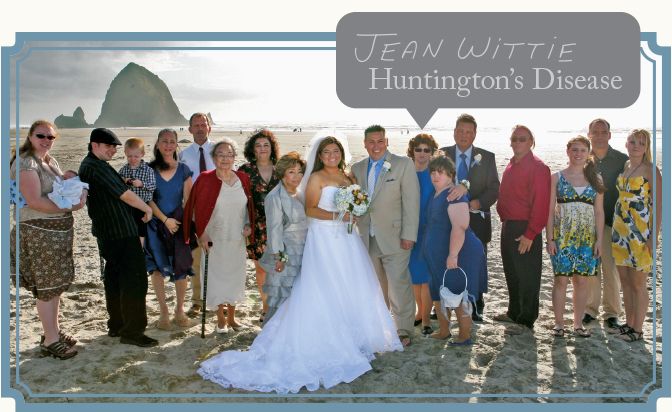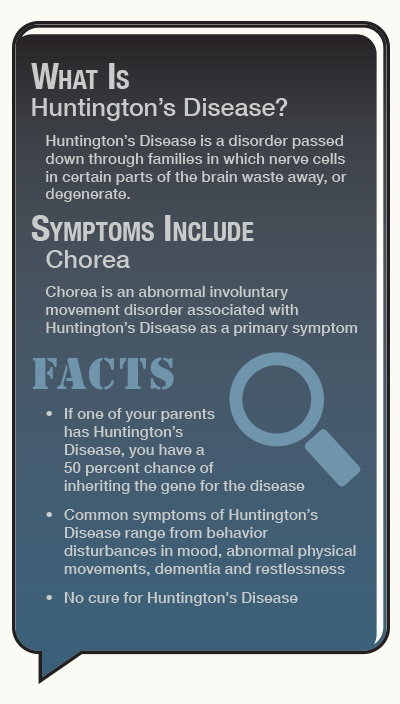May Is Huntington’s Disease Awareness Month
Jean Wittie shared her story with us back in November of 2012 for our special edition of Community magazine, In Their Words. Her story detailed how Huntington’s disease has affected her family. Below is her story.

Jean Wittie, directly right of the groom, with members of her family on the Oregon Coast
My husband Frank and I have been married for over 30 years. We have a blended family of seven children, six grand children and five great grandchildren. The two oldest boys are my boys from my first marriage, and they are the ones who have been diagnosed.
Todd is the younger one, he’s 43. He began having some problems – facial twitching and jerking – in 2009. He’d always had problems with his thyroid, and his doctor at the time thought all of Todd’s problems were related to that. The doctor kept raising and raising the medication, until he took Todd completely off it. Nothing worked.
I finally took him to my doctor, who thought he had MS. We went to see a neurologist who ordered an MRI and genetic tests. When the diagnosis came back, it blindsided us. We had no idea that there was anything like this anywhere.
 After Todd was diagnosed, his doctor ordered testing for Todd’s older brother, Dale. Dale had some symptoms, but they weren’t very pronounced, so he thought he was home free. But just before Christmas 2010, his diagnosis came back as positive for HD.
After Todd was diagnosed, his doctor ordered testing for Todd’s older brother, Dale. Dale had some symptoms, but they weren’t very pronounced, so he thought he was home free. But just before Christmas 2010, his diagnosis came back as positive for HD.
So I set out to learn as much as I could about Huntington’s. I found the UC San Diego Autism Center of Excellence and they were so encouraging. They invited Todd and myself to their research symposium, where we met researchers, officials with the Huntington’s Disease Society of America, and families with HD. It was all very encouraging.
As a result of that symposium, we were finally able to get both Todd and Dale on a medication that helped restore their quality of life.
Dale lives in his own home with his adult son, daughter and her family. Dale’s daughter and her family moved back to Oregon to be closer to Dale and help out.
Unfortunately, Dale’s daughter was diagnosed positive in March. Dale’s son, and Todd’s two daughters have not yet been tested. Todd’s two girls live in Alaska and want to be tested but they are working their way through the state’s medical system now. Dale’s son is practicing avoidance behavior – he’ll get to it, but for right now, he does not want to be tested.
My husband Frank has always been supportive of the boys and of me. He’s the one that keeps reminding me to be patient when I need to be.
 I still work and I go to school, so Todd is at home alone during the day. I make meals that will be easy for him to eat, he takes care of the yard, feeds the dogs… both my husband and I want Todd to have as normal a life while he still can.
I still work and I go to school, so Todd is at home alone during the day. I make meals that will be easy for him to eat, he takes care of the yard, feeds the dogs… both my husband and I want Todd to have as normal a life while he still can.
Our extended family is huge, and Todd and Dale have all of the love and support our family can offer. Various family members have attended the conferences, support groups, walks – everyone in the family is there for Todd and Dale.
I truly feel that if I stay positive and persevere, then there will be a cure. We all have to have the courage and the hope to keep going. You have to keep fighting.
So that’s my story.
This article first appeared in Caring Voice Community magazine.
Contact us
Did you enjoy this story? Email us your comments and questions and let's keep the conversation going. We encourage you to engage with us and other readers by following us on Facebook, Twitter, Instagram and Pinterest. Every person's journey is unique, and every perspective is valuable to us.

